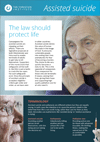Senior Liberal Democrat Vince Cable has become the latest high-profile MP to declare his opposition to any legalisation of assisted suicide.
Mr Cable said he is “personally opposed” to such a move and also commented that any decision to change the law on the issue rests with Parliament.
He said that MPs’ job is to: “legislate and to reach decisions on behalf of the public on complex ethical, legal and practical issues”.
The Twickenham MP warned about the potential impact of guidelines on prosecuting assisted suicide published by the Director of Public Prosecutions (DPP).
The DPP published his draft guidelines in September following a Law Lords ruling. A public consultation on the proposals closes on Wednesday.
Vince Cable said: “If the DPP shifts the balance of risk of prosecution, he will, in effect, change the law without the permission of Parliament in a matter of life and death: a very serious step.”
He said: “Having been a carer to a terminally ill loved one – my first wife, Olympia – I know such a situation is emotionally draining and extremely difficult.
“But”, he added, “hard cases make bad law”.
Highlighting recent coverage of assisted suicide in the media, Mr Cable said it is a big step from “understanding and sympathising” to “changing the law to legalise the practice more generally or remove the threat of prosecution”.
He concluded that the existing law should “remain and be respected”.
The DPP’s guidelines are already subject to a legal challenge by a disabled campaigner, Alison Davis, who says they are “unfair, unjust and fatally discriminatory against suffering people”.
A group of lawyers, judges and Peers has heavily criticised the guidelines saying they are “not fit for purpose” and place vulnerable people at risk.
In September Justice Secretary Jack Straw expressed his opposition to any weakening of the assisted suicide law.
He said: “That would give a green light to assisted suicide, and my worry has always been the potential for abuse.”
The Blackburn MP added: “I’ve had some experience of loved ones in the terminal stages of illness. I don’t think you should give relatives that discretion.
“I just think it’s wrong to consider assisting someone in suicide. It’s not something I’m willing to contemplate.”
David Cameron has also made clear his opposition to assisted suicide.
The leader of the Conservative Party said the law should not be changed to allow doctors and others to “accelerate death”.
Mr Cameron added: “I think the long-term consequences of permitting such action are too likely to be dangerous for society.”
His comments were made in a letter to pro-life campaigners three years ago during a previous attempt to weaken the law in Parliament.
A spokesman confirmed earlier this year that his views have not changed.
In July a bid to weaken the law on assisted suicide was voted down in the House of Lords.
Peers voted 194 to 141 against the plan to make it legal to help someone travel overseas to commit suicide.
And in October an 11th hour bid to legalise assisted suicide failed when Lord Alderdice’s amendment was withdrawn.
The amendment, which was tabled as part of the Coroners and Justice Bill, would have allowed the assisted suicide of people with an incurable illness provided they had a signed certificate from a coroner confirming that they had a “free and settled” wish to die.

